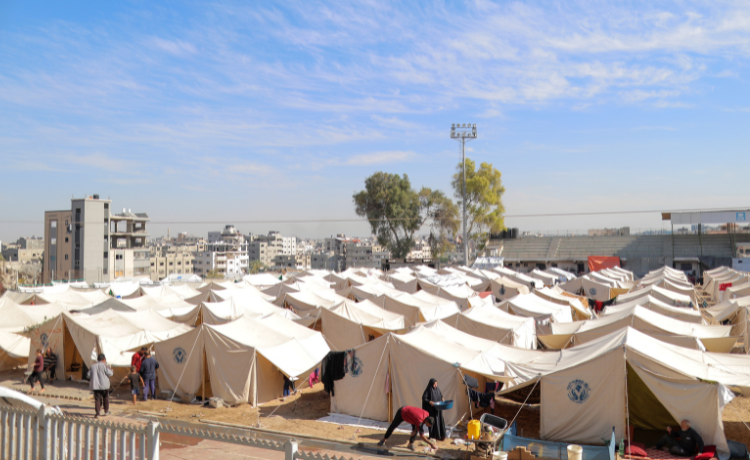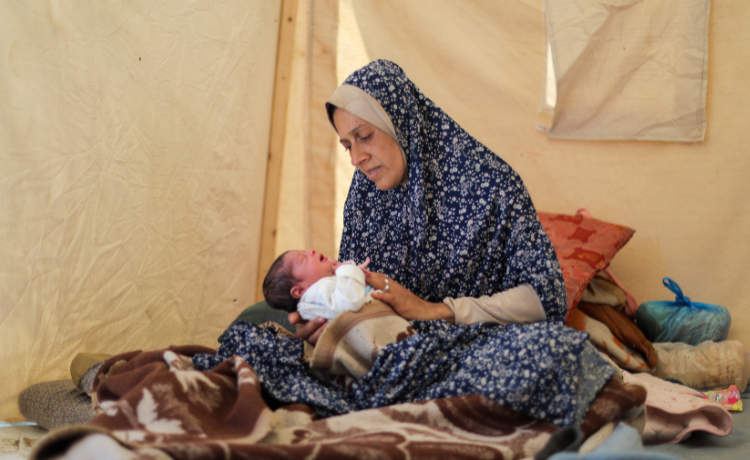News
“Where are we supposed to go?”: Women and girls in northern Gaza endure displacement, hunger and healthcare under attack
- 25 November 2024
News
NORTH GAZA, Occupied Palestinian Territory – Adla was forced from her home in Jabalia, in North Gaza, after it was demolished by Israeli forces. “We had no mattress, no food, no clothes – nothing. We fled the airstrikes as we were,” she told UNFPA, the United Nations sexual and reproductive health agency.
Since 6 October 2024, up to 130,000 people have been uprooted from North Gaza to Gaza city. In some displacement sites, up to 70 per cent of those sheltering are children and women – among whom over 2,000 are estimated to be pregnant.
During the siege on North Gaza, Adla described women and children being separated from men and ordered to walk. “A tank followed next to us, firing as we moved.” She gathered together with some other women and raised a white flag in a desperate bid for safety. “We have no shelter – where are we supposed to go?”
Adla and her family are now living in the Yarmouk sports stadium in Gaza city, which is hosting people from across northern Gaza. So far just 23 tents have been provided for 300 families; normally, each tent would house one family.

Many women and girls are seeking shelter in abandoned homes and destroyed clinics, or sleeping out in the open, exposing them to gender-based violence, abuse, disease and infections.
UNFPA partners evacuated to Gaza city have set up medical points providing healthcare, counselling and specialist referrals. But these services are severely limited by chronic shortages of tents, electricity, fuel and transport, often leaving those most vulnerable without access to critical support.
The perils of pregnancy in a warzone
The increasingly perilous situation for women and girls is made worse by the lack of sanitary facilities, clean water and ever dwindling food supplies. Malnutrition rates are reported to be spiking, with over 550,000 women facing acute hunger and more than 15,000 pregnant women on the verge of famine.
With weakened immune systems and at risk of waterborne diseases, pregnant and breastfeeding women must also survive alongside piles of rubbish and sewage and with barely any access to healthcare. In these dire circumstances, there are around 50,000 pregnant women in Gaza, with 4,000 deliveries expected in the next month alone, according to UNFPA. Initial data indicate that in the last six months there has been a sharp rise in reported miscarriages.

Jawaher, from northern Gaza, described her harrowing experience of going into labour while fleeing the onslaught. “I was very afraid. I wasn’t ready for childbirth yet.” She arrived at the Al-Sahaba Hospital, which UNFPA supports with medical equipment and supplies, just in time to give birth safely.
“I delivered my baby after two days of pain and fear. In the chaos and panic of being displaced, my newborn suffered a head injury.”
Jawaher and her newborn are sheltering in Yarmouk, but without essentials like diapers, clothes, milk or clean water, she is struggling to care for the baby and both are malnourished. “We need all the basic necessities for ourselves and our children. We are very tired.”
Life-saving partnerships
Despite a near-total lack of humanitarian supplies entering Gaza, UNFPA is working closely with UNRWA, the United Nations Relief and Works Agency for Palestine, and partner organization Palestinian Medical Relief Society to provide sexual and reproductive health services.
At present, 72 midwives are working in UNRWA medical points located in shelters, ensuring care despite facing multiple operational challenges – from their own displacement to constant security risks and severe shortfalls in resources of all kinds. The midwives are committed to providing antenatal and postpartum care, emergency obstetric support, family planning consultations and referrals for high-risk cases.
Baby Mohammed is one of the many lives touched by this partnership. Shortly after his birth in October 2024, he sustained shrapnel injuries to his face as the ambulance that transported him to the Indonesian Hospital in northern Gaza was bombed. His mother was killed in the attack.
With Mohammed’s father and siblings displaced to the south, the midwifery team managed to track down one of his aunts in Gaza city, who stepped in to care for him. The team also arranged a medical visit and thorough examination, administering his first vaccination in November and continuously monitoring his progress.
A health system on its knees
Fewer than half of hospitals are now partially functional in Gaza; in the north, the UNFPA-supported Kamal Adwan and Al Awda hospitals are only able to deliver minimal services.
Over the past 12 months, UNFPA has helped some 45,000 women in Gaza to give birth safely – about three quarters of all deliveries since the escalation of the conflict. In light of the recent evacuation orders in North Gaza, the agency and its partners are working to ensure maternal health and protection services can continue.